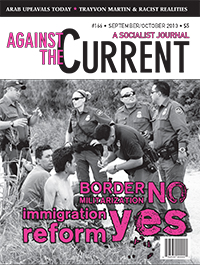Against the Current, No. 166, September/October 2013
-
Heroism Against the Machine
— The Editors -
Suited Vandals Pillage Detroit
— The Editors -
Two Americas -- Where Racism Lives
— Malik Miah -
"Calm Reflection" or Justice?
— Meleiza Figueroa -
East St. Louis As Detroit's Mirror
— Jennifer F. Hamer -
Immigration "Reform"
— The Editors -
A View from the Base
— Joaquín Bustelo -
The Case for Critical Support
— Milton Fisk -
Organizations & Leaders' Critique of S.744
— a statement by the Mexican American Political Association -
On Egypt
— an interview with Gilbert Achcar -
Can People Get What They Want?
— an interview with Gilbert Achcar -
Austerity American Style, Part 2
— Jack Rasmus -
Wadada's Suite of Liberation
— Mark Mendoza - Remembering E.P. Thompson
-
Commemorating a Classic of History
— The Editors -
Recovering the Centrality of Class
— Ellen Meiksins Wood -
Remembering E.P. Thompson
— Paul Buhle -
A Flawed Conception of Class
— Bruce Levine -
History as Argument
— Bryan D. Palmer - Reviews
-
Looking Inside the Education Crisis
— Robert Bartlett -
The Troubled State of Labor
— Stephanie Luce -
A Focus of Anti-capitalist Struggle?
— Jan Cox -
The Roots of Academic Freedom
— Michael Steven Smith -
Communist Writing in Anti-Communist Times
— Judith E. Smith -
Tony Cliff as a Socialist Leader
— Samuel Farber
The Editors
THE YEAR 1963 was momentous on many levels. In our previous issue (#165) we commemorated the assassination of civil rights organizer Medgar Evers, one among many martyrs of the bloody racist response to the growing civil rights movement. It was also the year of the military overthrow and assassination of Ngo Dinh Diem, the ruler of South Vietnam, in a coup approved by the administration of U.S. president John F. Kennedy, who would himself be assassinated in November.
Less noted but of great importance in the writing of working class history was the appearance of the classic work of Edward P. Thompson, The Making of the English Working Class, 1780-1832, viewing the violent transformation brought by the Industrial Revolution as it was experienced from below, in the lives of people being formed into a modern working class.
Too often considered solely as the product of an objective economic process that produced “progress” despite the attendant difficulties, in Thompson’s view, this working class needed to be understood as an agent of its own formation and coming to consciousness. Creatively and controversially, Thompson’s work developed this theme in ways that shaped a new generation of left and labor historians.
Against the Current has asked a number of historians to briefly assess Thompson’s work, its legacy and its impact on their own lives and careers. The first of these responses — Paul Buhle, Bruce Levine, Bryan Palmer and Ellen Meiksins Wood — appear here, and additional contributions are forthcoming in our next issue.
September/October 2013, ATC 166

